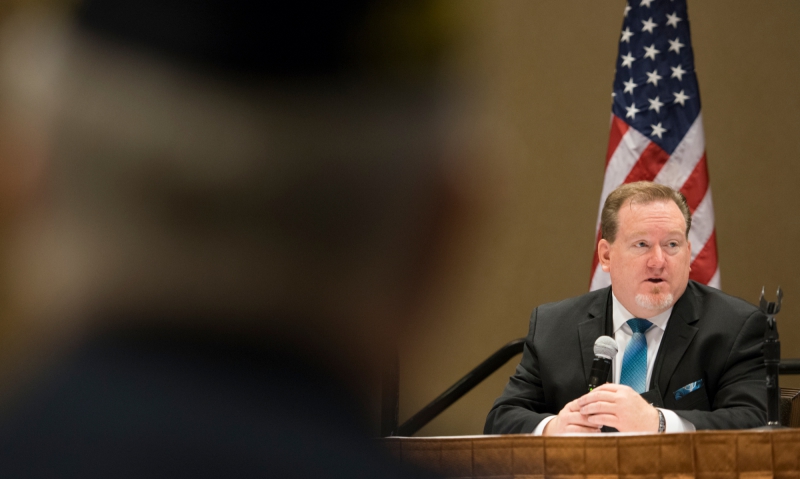
Legion hears from key stakeholders and professionals within the veterans community about best practices for preparing, supporting and connecting veterans to the organizations that want to hire them.
The American Legion's National Veterans Employment and Education (VE&E) Commission held an employment summit Aug. 19 at the Atlantis Casino Resort Spa in Reno, Nev., to hear from key stakeholders and professionals within the veterans community about best practices for preparing, supporting and connecting veterans to the organizations that want to hire them.
The summit, held in conjunction with the Legion’s 99th National Convention, featured panel discussions about the career landscape facing both veterans and employers, as well as working through the challenges facing both parties in navigating the transition from the military to civilian employment. Topics for the panel discussions included:
· Career development programs;
· Transition Assistance Program (TAP);
· Corporate careers; and
· Accommodations and the workplace.
“The Department of Defense estimates that approximately 250,000 servicemembers, including members of the National Guard and reserve, will leave the military annually over the next several years,” said Matthew Miller, a senior advisor at the U.S. Department of Labor’s Office of the Assistant Secretary for Veterans’ Employment and Training. “If veterans are not taken care of on the back end of their service, they will not recommend to their friends or relatives to join the military on the front end. We can’t afford to lose that.”
The career development programs panel, moderated by Military.com’s Veteran Employment Senior Director Liz McLean, analyzed ways servicemembers and veterans can acquire more skills and experience prior to entering the workforce. In particular, this panel addressed how fellowships and training programs can move veterans from transitional employment into full-time career opportunities, and how corporations can tap into these programs.
“After 29 years of service (in the Army), I had no idea what I wanted to do when I left the military,” U.S. Chamber of Commerce Foundation Lead National Trainer/Program Manager Rob Comer said. “One of the most valuable programs that I think (best suited me) was the Corporate Fellowship Program. That was an initiative that was started (to help transitioning military leaders) find jobs. That program is now a national program.”
According to the foundation’s website, The Hiring Our Heroes Corporate Fellowship Program provides transitioning servicemembers with management training and hands-on experience in the civilian workforce. Candidates are matched with participating companies based on the skills and preferences of both parties.
Comer said the program, hosted by military installations and major cities across the country, helps expands corporate America's understanding of the veteran job market and preparing those individuals for smooth transitions into meaningful civilian careers.
“We’re very proud to say that the program is currently at 12 installations nationwide,” Comer said. “The margin is wide open for them. That program is a partnership with corporate America – companies like Microsoft, Amazon, UPS, 7-Eleven (and) Starbucks,”
In August 2013, the Northern Virginia Technology Council (NVTC) launched the Veterans Employment Initiative to provide transitioning veterans with better employment opportunities within Virginia's technology community. This initiative matches veterans with jobs, internships, mentorships and certifications, while also providing support to member companies in their efforts to hire, train and retain qualified veteran employees.
According to NVTC's website, the Veterans Employment Initiative aims to be a model community for veteran employment resource by:
· Expediting the transition from military to civilian employment;
· Creating innovative ways for companies in the region to hire, train and retain veterans;
· Collaborating with state and federal policymakers to remove the barriers that prevent government contractors from effectively hiring and training veterans;
· Assisting NVTC member companies in establishing or expanding their own internal veteran programs;
· Helping veterans in developing the skills necessary to find a job in the private sector and succeed in their private sector careers; and
· Increasing veteran employment among NVTC member companies.
“It’s a holistic initiative brought on by the businesses that saw the value in bringing veteran talent into their companies,” said NVTC Veterans Employment Initiative Program Manager Steve Jordon, who served 31 years in the Navy. “What we’ve done as an association, in partnering with the great folks at Monster and Military.com, is built an incredibly robust virtual presence with all the things the veterans need that really add value to what they get through TAP.
"Monster.com has 1 million veteran resumes in their database. So, what they’ve done is they opened that up to the connected companies under the Northern Virginia Technology Council. We are now partnered with the Consumer Technology Association (comprised of) 2,000 employers. Numbers matter – we look to expand this initiative and find great value to not only the job seekers, but the companies themselves.”
The TAP panel included remarks from a veteran who recently transitioned from active duty, and a human resources representative that provides services to onboard veterans. Other speakers, including the Legion’s own Kaitlin Gray, VE&E assistant director of small business, discussed their personal experiences and trends in transition, what helped them and what did not help them.
Continuing the discussion on transition, the corporate careers panel focused on military culture, skillsets, training, applicability of experience and how these skills are translated from the military to the corporate environment. Speakers addressed the requisite skills for survival in the corporate landscape including:
· Networking,
· Interviewing, and
· The paradigm shift in how the post-9/11 veterans engage with their employers.
- Convention

